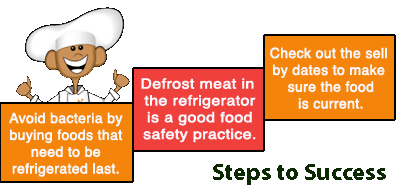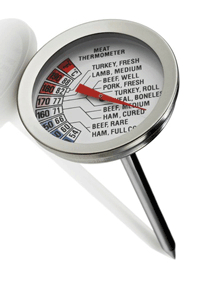The Knowledge Gap and Food Safety

Food safety means keeping our food free from bacteria and other germs that can make us very ill.
Unfortunately, there is still a knowledge gap about food-borne illness. Many parents believe that food poisoning only occurs shortly after eating. The real truth is that symptoms can occur as early as two hours after eating to a few days after exposure.
So it is can be difficult to determine the source of food poisoning, it could have been something you ate out or at home.
The good thing about food-borne illness is that it is preventable. You are your child's best teacher. Role model good food safety practices and teach your children to make them part of their every day routine when interacting with food.
To keep your family healthy and safe from germ free foods avoid the most common mistakes and follow these recommendations:

-
Whether you are eating at home or in a restaurant, make sure your food is cooked thoroughly. Avoid raw eggs and rare meat. Food cooked at the proper temperature will kill any bacteria
-
Don't leave food sitting on the stove or counter. Label them with date and store them right away. Store food at the proper temperatures.
-
Don't leave food out for 2 hours or more. If food is left out because of a party or some other event, follow the 2 hour rule and throw the food away.
-
Don't let your family get sick because of a faulty refrigerator. Check your refrigerator routinely to make sure they are set at 40 degrees F and your freezer at 0 degrees F.
-
Most people do not wash their hands long enough. Wash your hands vigorously for 20 seconds before and after touching or eating food.
-
Check the expiration date on cans and packaged foods. Throw them out if they are expired.
-
Fruits and vegetables can be a source of bacteria. Wash your fruits and vegetables well. Use a vegetable scrubber if you have one. It is hard to know how many people touched the produce before you bought it.
We don't want to be wasteful but it is always better to be safe than sorry. So if you are not sure if the food is good, throw it away.
Healthy Eating

Healthy Child

Written by Anne Kolker
•
Written on Nov 13, 2008
•
Last updated on Oct 25, 2013



0 Comments